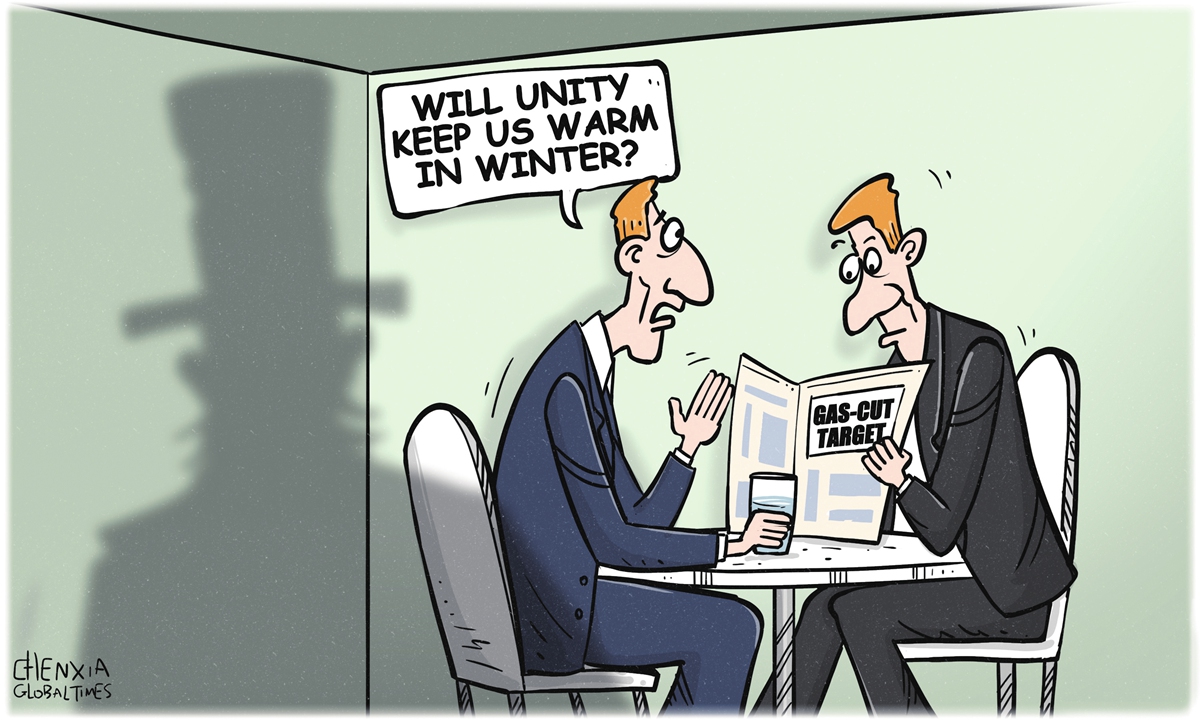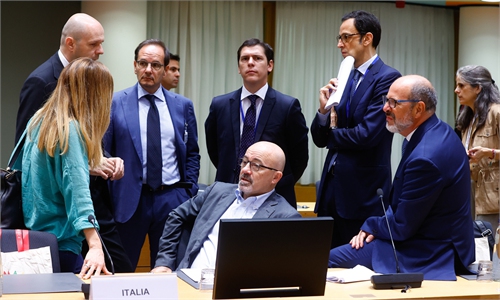
EU Unity Illustration: Chen Xia/GT
On Tuesday, the European Union (EU) reached a political agreement on a voluntary reduction of natural gas demand this winter by 15 percent compared to their average consumption in the past five years. However, US media Politico reported that the gas savings target, in the end, might be closer to 10 percent, partly because of "a smorgasbord of carve-outs and exemptions."
Apparently, the EU's gas saving targets fall "unequally" across the member states. According to the deal, some countries will have their target reduced to 7 percent or less, while some can be completely exempted altogether from the gas cut obligation.
It is certain that reducing dependence on natural gas remains one of the EU's general goals, and there are two layers behind such an ambition.
First, Europe seeks to reduce its use of natural gas, because the current energy shortage across the European continent is forcing it to do so. Second, the EU is mainly focused on reducing natural gas imports from Russia due to worries about Moscow's countersanctions that may completely halt gas deliveries.
Europe is now indeed facing a thorny dilemma. "Saving gas for a safe winter" has already become the EU's strategic goal. But the gas cut will, for sure, have a significant impact on European society, including people's livelihoods, as well as production, and the overall economic recovery.
It does not rule out the possibility that Brussels and Moscow are willing to give each other a step down. For example, in the face of the European people's complaints about the energy crisis, a de-escalation of the Russia-Ukraine conflict, and a colder winter, the EU may loosen its sanctions on Russia and temporarily cease cutting gas. And Russia may be willing to provide more gas in such a scenario. However, the current stalemate between the EU and Russia is a knot that is not so easy to untangle in the short term. And it may even become a deadlock in the end.
German Vice Chancellor Robert Habeck said the Tuesday agreement shows European solidarity and unity, but this looks more like a compromise than a sign of unity, as the disparity of the gas savings target figure of EU countries embodies the differences in economic development and energy structure between large and small countries within the union.
It also shows that in the face of the crisis, Europe's political solidarity on the surface - or the uniformity of decision-making and actions - is only empty talk. There are 27 member states in the EU, and obviously, they are not a monolithic bloc. For instance, some are heavily dependent on Moscow's gas in terms of Russian energy imports.
Thus, despite an agreement, EU member states will unlikely fully comply with their commitments to the deal. Instead, they will act according to their own needs to maximize their interests.
The divergences among EU countries shown in this deal will affect the union's consistency when dealing with the wider energy crisis. It will also affect the realization of the continent's green transition, an ambitious blueprint advanced by the European Commission.
For the moment, Europe is trapped with puzzles both at home and abroad. The COVID-19 pandemic strikes the continent repeatedly; capitalism faces a systematic economic crisis; and the external geopolitical turmoil of the Russia-Ukraine conflict spills over to the energy sector. All these crises combined are making Europe look more chaotic than ever. If the EU continues to require individual countries to implement the reduction of gas demand in accordance with the EU's goals through the so-called coordination mechanism, then the EU is bound to be seriously divided.
Today's European politicians only care about their political position instead of worrying about people's livelihoods. They only seek short-term interests and lack long-term strategic vision. Worse, they lack political experience. As a result, these politicians can hardly handle the complicated governance of Europe, leaving the whole continent without a sense of direction.
The US is the most willing to see the EU hurt itself because of sanctions against Russia, hoping to divide and weaken Europe further. Completely kidnapped by the US, the EU has even less consideration for any independent diplomacy and defense.
The author is a reporter with the Global Times. opinion@globaltimes.com.cn

